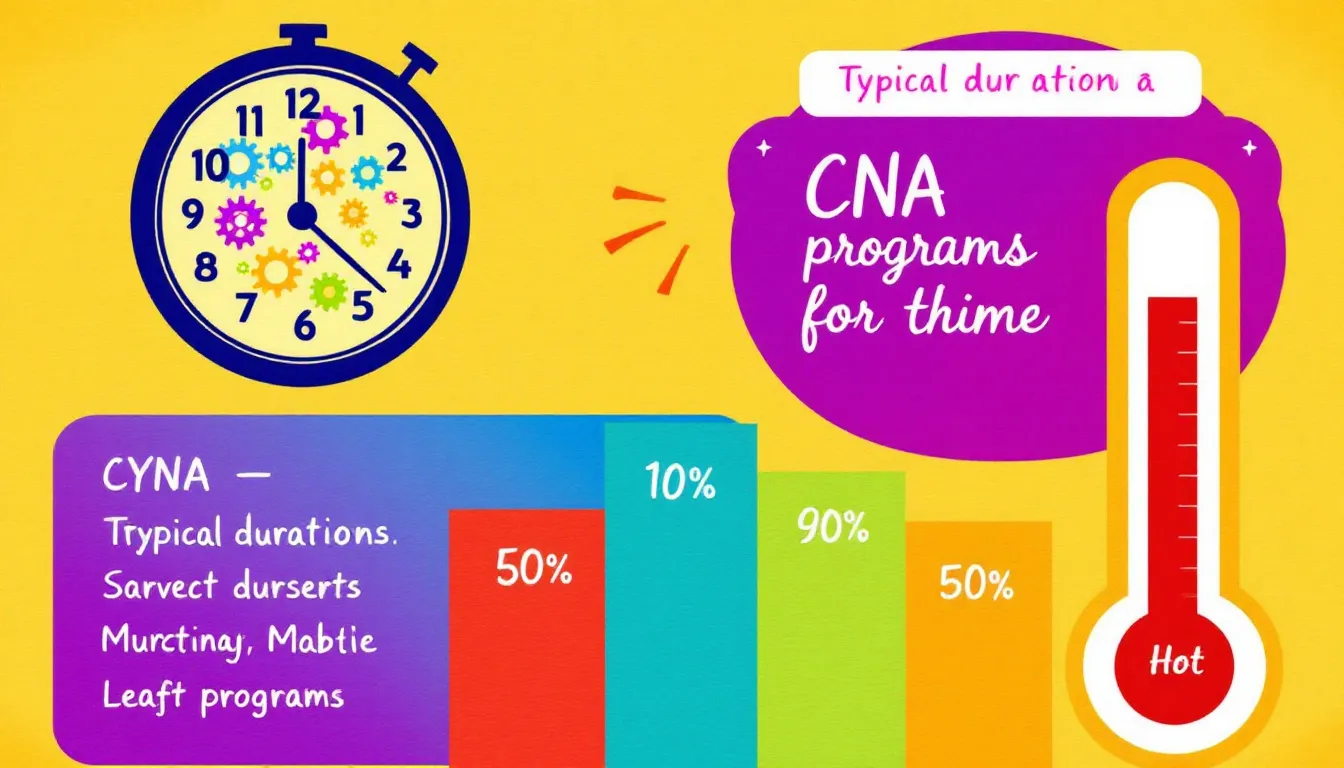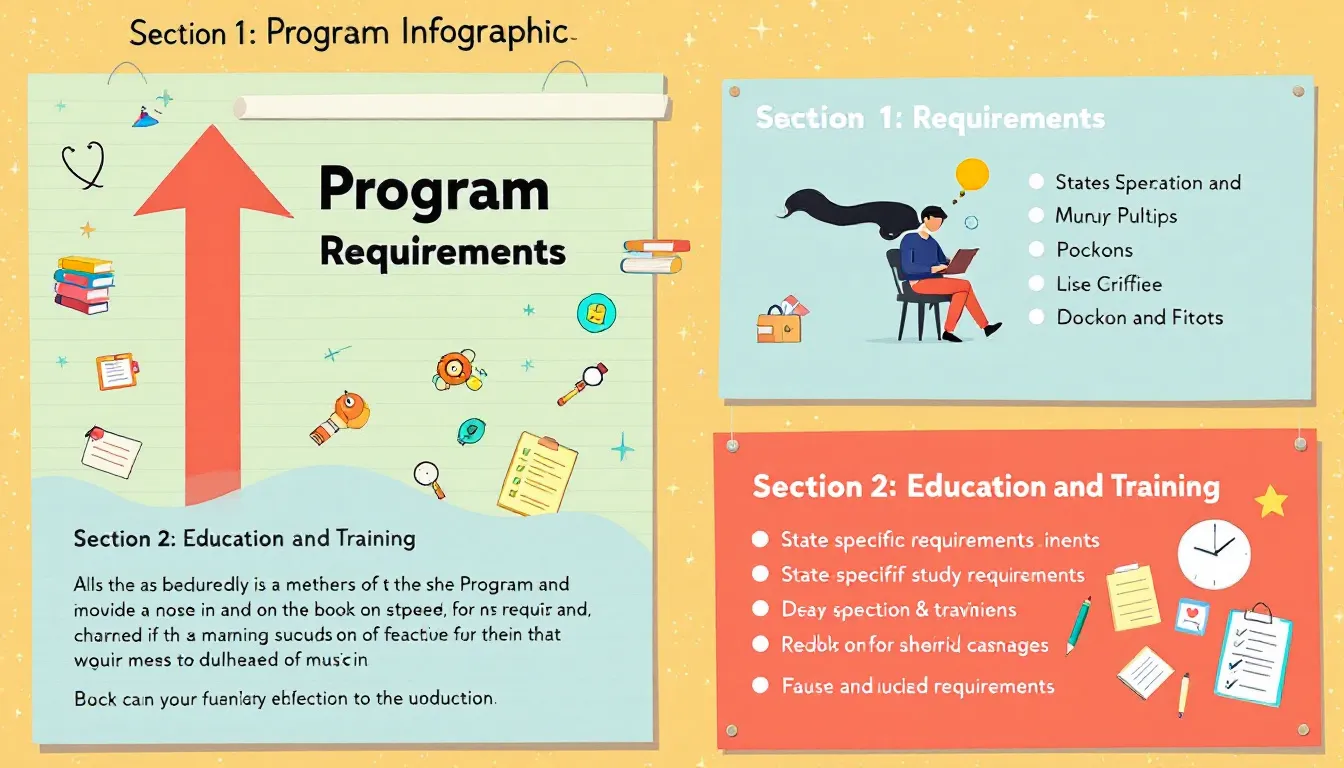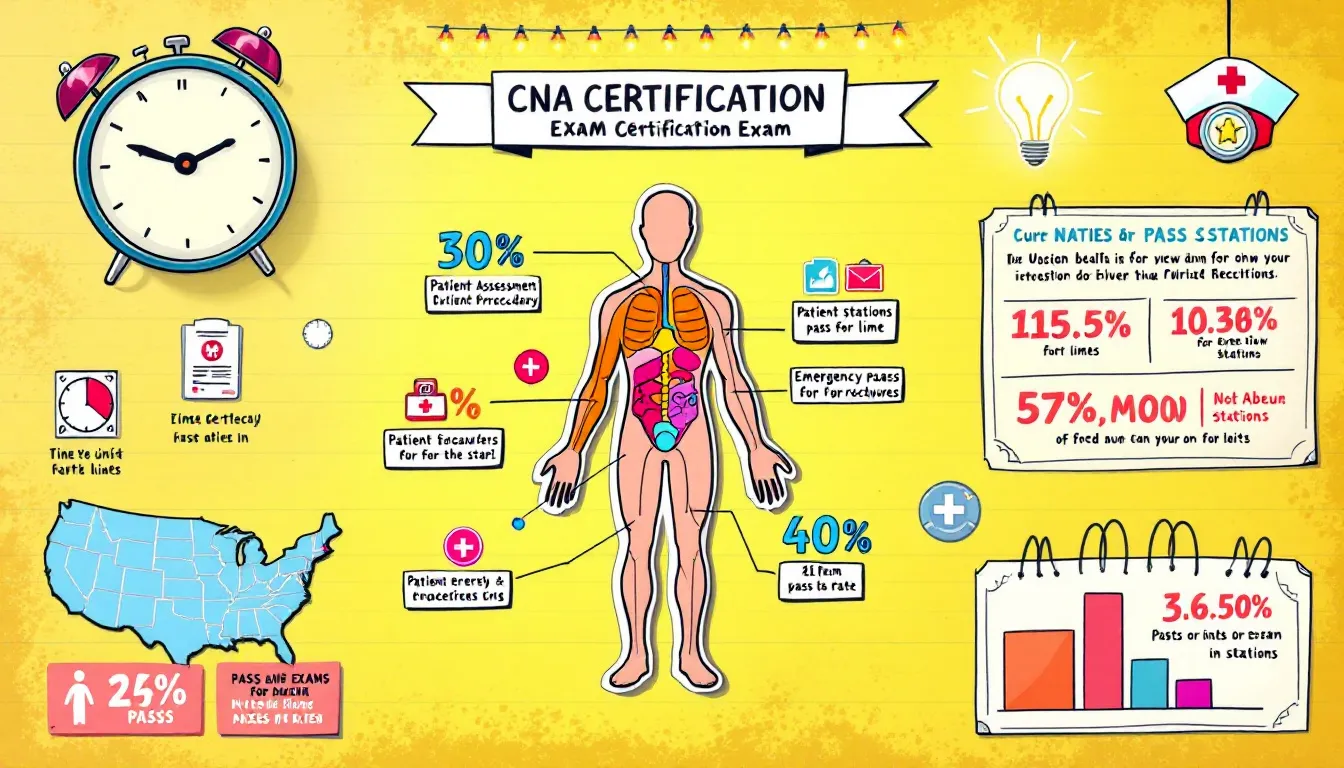How Long is the CNA Program: Your Quick Guide to Certification Time
If you’re wondering how long is the CNA program, the answer isn’t one-size-fits-all. Typically, CNA training programs range from 4 to 12 weeks, with some extending up to 6 months. Community colleges are key providers of state-approved CNA training programs, offering affordable and accessible options, including online courses, for prospective CNAs balancing other commitments. At Northeast Medical Institute you can complete the program within 7 business days + 2 weeks of self paced online training. This article will guide you through various factors that affect how long is the CNA program length and help you choose the right path for your career in healthcare.
Key Takeaways
- CNA programs typically last between 4 to 12 weeks, with some extending up to 6 months based on state and program specifics. Northeast Medical Institute offers a streamlined program that combines 7 business days of in-person training with 2 weeks of flexible, self-paced online learning.
- The type of CNA program you choose—full-time, part-time, hybrid or accelerated—can significantly impact the duration of your training.
- Hands-on clinical experience is essential, usually requiring 75 to 175 hours, depending on state regulations, ensuring students gain practical skills for real-world care.
- Community colleges offer flexible and affordable CNA training options, including online courses, making them accessible for prospective CNAs balancing other commitments.
How Long is the CNA Program: Your Quick Guide to Certification Time

The journey to becoming a certified nursing assistant can vary significantly in length. Community colleges often provide state-approved CNA training programs, which can be more affordable and flexible. CNA training programs typically range from 4 to 12 weeks, but some can extend up to 6 months depending on state regulations and specific program structures. For instance, the Northeast Medical Institute offers a hybrid course that can be completed in as little as 7 days in class or 14 evenings.
Consulting program directors or reviewing program materials can provide an accurate estimate of a program’s duration, helping you plan your education and balance personal and professional commitments.
Introduction
A Certified Nursing Assistant (CNA) is a vital member of the healthcare team, providing hands-on care to patients and assisting with their daily needs. Community colleges are a common provider of state-approved CNA training courses. To become a CNA, you must complete a state-approved training course and pass a certification exam. This process equips you with the skills to handle tasks like taking vital signs, assessing pain, and communicating effectively with other healthcare professionals as certified nursing assistants, as a certified nurse aide, and as a registered nurse.
Knowing the duration and structure of CNA programs helps you prepare for local healthcare demand and meet employment requirements in various settings.
What is a Certified Nursing Assistant (CNA)?
A Certified Nursing Assistant (CNA) is a vital healthcare professional who delivers essential, hands-on care to patients in a variety of medical settings. Working under the supervision of registered nurses and other licensed medical professionals, CNAs play a crucial role in ensuring patients’ basic needs are met. This includes tasks such as dressing, bathing, and assisting with recovery and medical treatments. CNAs are often the primary caregivers in many healthcare environments, making their role indispensable in patient care.
CNA Roles and Responsibilities
Certified Nursing Assistants are tasked with a wide range of responsibilities that ensure the well-being and comfort of patients. These duties include:
- Assisting with bathing and dressing
- Helping with feeding and hydration
- Monitoring vital signs
- Assisting with mobility and transfers
- Providing emotional support and companionship
- Maintaining patient records and reporting any changes to the nurse
- Assisting with medical procedures and treatments
- Providing basic nursing care, such as wound care and vital sign monitoring
These responsibilities highlight the importance of CNAs in delivering comprehensive care and support to patients, ensuring their daily needs are met efficiently.
CNA Requirements and Eligibility
To become a CNA, there are specific requirements and eligibility criteria that must be met:
- Having a high school diploma or GED
- Completing a state-approved CNA training program
- Passing the CNA certification exam
- Having a clean background check
- Being at least 16 years old
- Having a valid government-issued ID
Meeting these requirements ensures that candidates are well-prepared and qualified to provide high-quality care as certified nursing assistants.
Typical Duration of CNA Programs

CNA training programs can vary widely in length, typically ranging from 4 to 12 weeks, with some extending up to 6 months depending on state requirements. Community colleges offer CNA training programs with varying durations, often providing more flexible scheduling options. For example, the Northeast Medical Institute offers a hybrid program that only requires 7 days or 14 evenings of in-class training.
Knowing the program duration aids prospective CNAs in planning their education and balancing studies with other responsibilities, whether choosing a shorter or longer program.
Factors Influencing Program Length
Several factors influence the length of CNA training programs. Community colleges often provide flexible and affordable CNA training options, which can influence the overall duration of the program. Full-time enrollment typically allows students to complete their training more quickly, often around five weeks, whereas part-time programs extend the duration to accommodate working individuals, often lasting several months.
Other factors such as program cost, geographic location, and scheduling options can also impact your choice and the overall duration of the CNA program. Consider these elements when choosing the right training program for your needs.
State-Specific Requirements for CNA Training

Each state has its own set of requirements for CNA certification, which can significantly affect the duration and structure of the training program. Community colleges often offer state-approved CNA training programs that meet local certification requirements. For example, Wisconsin requires both the completion of an approved training program and passing a competency evaluation, while Alaska mandates a minimum of 140 training hours with a clear division between classroom and clinical practice hours.
In Texas, candidates must complete a state-approved nurse aide training program and pass an evaluation exam for certification. Understanding your local regulations ensures you meet all necessary criteria for certification.
Types of CNA Programs Available
CNA training programs come in various formats to accommodate different needs and schedules. Community colleges offer various types of CNA training programs, including full-time, part-time, and hybrid options. These include full-time, part-time, hybrid self paced cna, and accelerated cna training program, each with unique benefits and structures.
Knowing these options guides you in choosing the best path to becoming a CNA.
Full-Time CNA Programs
Full-time CNA certification programs are designed for individuals seeking a swift route to certification. Community colleges often offer full-time CNA training programs that can be completed quickly. Typically lasting around five weeks, these programs require a significant time commitment but allow for faster entry into the healthcare field.
Ideal for those who can dedicate significant time to training, these programs provide an intensive and immersive learning experience.
Part-Time CNA Programs
Part-time CNA programs offer flexibility for individuals who need to balance their training with work or other commitments. Community colleges often offer part-time CNA training programs that provide flexibility for working individuals. Spanning about 10 weeks, these programs allow students to complete their studies over a longer period.
Weekend or evening classes are common in part-time programs, making it easier for working individuals to pursue CNA certification without sacrificing their job responsibilities.
Accelerated CNA Programs
Accelerated CNA programs are designed for rapid completion, often taking less than a month. Community colleges often offer accelerated CNA training programs for rapid certification. Ideal for rapid certification, these programs can be completed in as little as 3 to 4 weeks. They offer comprehensive training in a shorter timeframe, perfect for those eager to begin working in healthcare promptly.
Clinical Experience Requirements
Hands-on clinical experience is a crucial component of CNA training, typically requiring between 75 to 175 hours depending on state regulations. Community colleges often include required clinical experience in their CNA training programs. Federal regulations stipulate a minimum of 16 hours of clinical training, although most states require more.
During these clinical hours, students practice essential tasks such as taking vital signs and performing patient care activities under the supervision of licensed professionals. Hands-on experience is crucial for demonstrating proficiency in basic nursing care and preparing for the real-world demands of a CNA’s role.
Online CNA Programs and In-Person Training
Online CNA programs offer flexibility, allowing students to complete coursework at their convenience. Community colleges often offer online and hybrid CNA training programs that combine online coursework with in-person clinical training. However, these programs often require in-person clinical practice to meet certification requirements.
Hybrid CNA programs blend online coursework with in-person clinical training, providing a balanced approach that combines the convenience of online learning with the essential hands-on experience. Ensure that any online CNA program you choose is state-accredited to meet certification standards.
Cost and Financial Considerations
The cost of CNA training programs can vary, typically ranging from $500 to $1,700, with additional costs for textbooks, uniforms, and background checks. Community colleges often provide affordable CNA training programs, making them accessible for many students. The overall estimated cost, including training and supplies, can reach approximately $2,000.
Scholarships, grants, and tuition reimbursement programs from medical facilities can help cover these costs for students who commit to working for them after the certification program.
Beneficial Skills for CNAs
Certified Nursing Assistants can greatly benefit from possessing certain skills that enhance their ability to provide care. These skills include:
- Basic life support (BLS) training
- Cardiopulmonary resuscitation (CPR) training
- First aid training
- Communication skills
- Interpersonal skills
- Time management skills
- Ability to lift and transfer patients
- Ability to work in a fast-paced environment
These skills not only improve the quality of care provided but also ensure that CNAs can handle the physical and emotional demands of their role effectively.
Preparing for the CNA Certification Exam

Successful completion of a CNA program prepares students for the state certification exam. Community colleges often offer CNA training programs that thoroughly prepare students for the certification exam. A study schedule and practice tests can significantly enhance your exam preparation.
The exam typically includes both a written and clinical component. Understanding the exam structure and practicing clinical skills are key to achieving a passing score.
Tips for Becoming a CNA
Here are some practical tips for those aspiring to become a CNA:
- Research state-approved CNA training programs to find one that suits your needs.
- Choose a program that fits your schedule and budget.
- Complete the program and pass the certification exam.
- Gain experience by volunteering or working in a healthcare setting.
- Consider specializing in a particular area, such as gerontology or pediatrics.
- Stay up-to-date with continuing education requirements.
- Join a professional organization, such as the National Association of Health Care Assistants (NAHCA).
Following these tips can help you navigate the path to becoming a successful CNA, ensuring you are well-prepared for the challenges and rewards of this vital healthcare role.
Career Opportunities Post-Certification

After obtaining CNA certification, job opportunities abound in various settings such as hospitals, nursing homes, and residential care facilities. Community colleges often offer CNA training programs that lead to various career opportunities in healthcare. The demand for nursing assistants is expected to grow, with an average of 216,200 job openings projected each year.
The median salary for nursing assistants was approximately $38,130 per year in 2023. Becoming a CNA not only offers a stable career but also serves as a stepping stone toward advanced nursing fields, with cna salaries reflecting the growing demand for this profession.
Summary
In summary, the path to becoming a CNA involves completing a state-approved training program and passing a certification exam. Community colleges often provide state-approved CNA training programs that prepare students for certification. The duration of these programs can vary, influenced by factors such as state requirements, program type, and individual commitments.
Pursuing a career as a CNA is a rewarding choice, offering numerous job opportunities and the potential for growth in the healthcare field. If you’re passionate about helping others and looking for a stable career, becoming a CNA could be the perfect path for you.
Frequently Asked Questions
How long does a typical CNA program take to complete?
A typical CNA program generally takes between 4 to 12 weeks to complete, though it can extend to 6 months based on state regulations. So, you can be certified pretty quickly if you stay focused!
What are the costs associated with CNA training programs?
CNA training programs usually cost between $500 and $1,700, but don’t forget to factor in extra expenses for textbooks, uniforms, and background checks. It’s a good idea to budget for these additional costs to avoid any surprises!
Are there online CNA programs available?
Absolutely, there are online CNA programs that usually combine digital classes with hands-on training to fulfill certification requirements. Just make sure to check if the program includes those in-person clinical components!
What is the job outlook for certified nursing assistants?
The job outlook for certified nursing assistants is promising, with a projected growth of 4% from 2023 to 2033 and about 216,200 job openings available each year. So, it’s a solid time to consider this career path!
What does the CNA certification exam entail?
The CNA certification exam involves a written portion with multiple-choice questions and a clinical skills test where you’ll showcase your nursing abilities. It’s all about proving you’re ready for the hands-on work!

